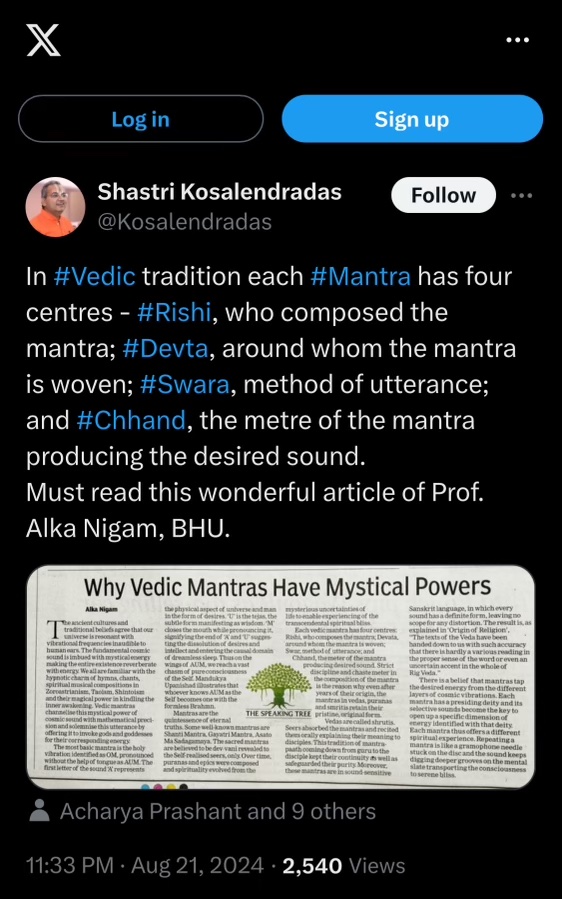Published July 2019: The Speaking Tree, Times of India https://timesofindia.indiatimes.com/blogs/toi-edit-page/spiritual-significance-of-ashtavakra-gita/
Truth is one, perceived and expressed differently by different sages. A seeker on the path of enlightenment gets entangled in his own delusions passing through the dense forest of spiritual knowledge given to us by our rishis. Ashtavakra, the great mystic philosopher offers the key to own the treasure of blissful state of being that too instantaneously to King Janak who at that moment had one foot in the saddle while mounting his horse, telling him that following his instructions Janak could attain liberation by the time he sat on his horse.
Liberation means shattering all chains of bondage and become one with the Creator. Ashtavakra and Shankaracharya both have insisted that it is possible to realize this great Truth in this existing body and become JIVANMUKHTA. The other school says that this is possible only when the body perishes which is in one way VIDEHMUKHTA. The firm conviction of the learned sage about the possibility of attaining freedom from bondage in this body forms the profound significance of the teachings contained in his book ASHTAVAKRA GITA rightly considered to be a “quantum leap into the absolute.”
Ashtavakra (so called because he was deformed at eight places in his body as a curse by his father) was educated by his maternal uncle Uddalak rishi and became a master of yoga-vidya at the early age of twelve. Dating back to the Vedanta period ‘Ashtavakra Gita’ is a radical version of non-dualistic Vedantic philosophy. A complex and multilayered narrative, bubbling with palpable energy it is pure, forceful, direct and one pointedly aimed at triggering Self Realization with no mention of personal God or suggestions for self improvement. It is precious because it is “the microstructure of enlightenment …if but for a fleeting moment”. It is like a springboard from where any evolved, ripe seeker can dive into the fathomless sea of blissful
realization of Self.
Ashtavakra Gita opens with three questions posed by Janak –how pure knowledge be acquired, renunciation made possible and liberation attained? Ashtavakra in twenty chapters in different ways satisfies the already wise king who represents all the evolved seekers on this journey – till he says “no more can be said” and Ashtavakra ends the song approvingly and smilingly “kincinnottisthate mama.”
The quintessence of the book comprises of precious sutras presented as answers to the straightforward questions of Janak. The prime sutra is to realize that you are the Self. Our identification with body, mind and intellect nurtures our Ego or ahamkar which is the main blocker on spiritual journey. Ego veils our real nature that is our Self. It remains happily engrossed in the sensuous and immediately appealing activities of body, mind, and intellect. Mind is like a vortex into which there is a whirling flow of thoughts that are continuously fed by senses. The more food for thoughts the more restlessness. With noble discipline the stormy agitating thoughts in Mind can be replaced by the healthier values of life like forgiveness, kindness and love which brings in mental tranquility.
The reality is that you are pure consciousness and depend upon nothing. Ashtavakra gives a very original example to explain this and says our consciousness is like a mirror that reflects everything that happens in our gross, subtle and causal bodies. It appears that the consciousness is dancing to the rhythm of this reflection but the mirror is stable and continues to be there while the reflection of images is fleeting and conditional. Moving reflection cannot disturb the static mirror. The same way Self cannot be affected by any superimposition. Stationed in this pure, blissful consciousness ‘Be happy’.
Ashtavakra prescribes meditation for the seekers only at this one place. Meditation means total oblivion of outer happenings. Meditate on KUTHASTHA which is a Sanskrit word for anvil which never changes but everything placed on it changes. Later on this crutch too has to be abandoned. You are pure Self and not perceivable by any imperfect idea- “na kinchinna ca kincana”. You are neither this nor that – this short phrase captures the essence of Vedantic thought. Let your Self remain untouched by unreal thoughts, let them pass as on screen. If you detach your Self from the body and fix it on your pure consciousness you will instantly be happy, calm and bondage-free. You are liberated.

Leave a Reply